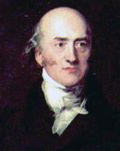George Canning was descended from the Irish family which had settled in Ulster and had been granted a manor in Londonderry, North Ireland, by King James I. Canning was educated at Eton and Oxford, where he received his master's degree in 1794. He entered Lincoln's Inn, but gave up the law shortly after entering Parliament (MP, 1793-1827). Canning was a Whig by background so that when he sought the friendship and patronage of the Tory leader, William Pitt the Younger, his integrity became suspect. However, Pitt ensured him advancement through the Foreign Office and the Board of Control and in turn Canning remained loyal to Pitt. First appointed Foreign Secretary (1807-1809) under the Duke of Portland in 1807 he held no really senior post again until he succeeded Viscount Castlereagh as Foreign Secretary (1822-1827). Canning believed in British independence from Europe, supporting a balance of power on the European continent together with a strong British navy. He also wished to strike out for new markets in South America. In domestic matters however he was a firm Tory suppressing any hint of rebellion among the people and opposing repeal of the Test Act against dissenters and the reform of Parliament. He did, however, consistently support Catholic emancipation. When the Earl of Liverpool became ill Canning moved quickly to secure the invitation of William IV to form a Government, but had great difficulty, as Tory mistrust surfaced again. He kissed the King's hands on 12 Apr 1827, becoming First Lord Commissioner of the Treasury and prime minister. His government concluded a treaty with France and Russia (6 Jul 1827) for the pacification of Greece. In domestic affairs Canning introduced the Corn Amendment Bill and announced the formation of a committee to consider the state of the revenue. After a little over one hundred days in office Canning died. [1, pp. 110-117] |

